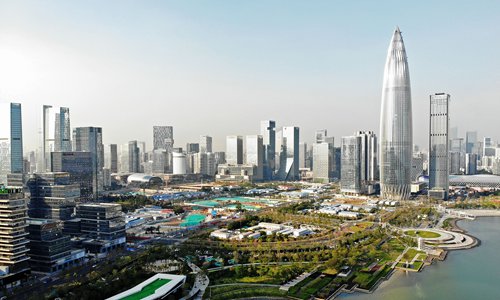
An aerial view of the Shenzhen Bay Super Headquarters Base, a newly developing area in Nanshan district, Shenzhen, South China's Guangdong Province. (Photo: VCG)
Officials from South China's Guangdong Province vowed on Monday to further open up its local economy and boost indigenous innovation as the country's economic powerhouse faces rising challenges amid an industrial upgrade process and the escalating China-US trade war.
Though the escalating trade war has had a "certain degree" of impact on Guangdong, trade has been generally stable and the province is confident in dealing with "all the challenges and risks," Guangdong Governor Ma Xingrui told a press briefing in Beijing on Monday.
Ma and other provincial officials attended the briefing to highlight Guangdong's reform and opening-up efforts and achievements, as part of the State Council Information Office's series of events to mark the 70th anniversary of the founding of the People's Republic of China.
"Guangdong is the epitome and symbol" of the remarkable development that China has achieved over the past seven decades, Ma said, pointing out that Guangdong's GDP has grown from a mere 2.03 billion yuan in 1949 to 9.7 trillion yuan ($1.4 trillion) in 2018.
Guangdong is known as a trailblazer of the country's reform and opening-up policies which began 41 years ago and helped the province become a world-class manufacturing and technology hub. It is home to nearly 5 million companies - the most among all Chinese provinces - including small manufacturing companies and tech giants such as Huawei.
"As the province that benefits from the reform and opening-up policy, Guangdong needs to speed up promoting reform and transformation, and set an example again," Yuan Fuhua, director of the economic growth office of the Chinese Academy of Social Sciences, told the Global Times on Monday, noting that opening-up is the only way to deal with the challenges.
Guangdong's approach to deal with changes from rising labor and other costs, competition from Southeast Asian countries and the escalating trade war could offer a path for the whole country as it did over the past 40 years, analysts noted.
Given Guangdong's massive trade, which accounts for one-fifth of China's trade with the US, the trade war has "inevitably had a certain degree of impact" on Guangdong, Ma said, but "we are confident that we will overcome all challenges and risks."
The trade war escalated after the US backtracked and slapped tariffs on $200 billion in Chinese goods and blacklisted Huawei. On Sunday, China issued a white paper on its stance on the trade talks, blaming the US for being unreliable and vowing not to back down on core issues.
Ma said that to ease pressure from the trade war, Guangdong will take measures to further expand opening-up, ease market access, explore foreign markets and boost indigenous innovation.
"We will further expand market opening. This strategy is unwavering," he said.
Business owners in the province have also expressed overwhelming confidence in overcoming potential difficulties. Some companies have been actively seeking alternative markets, while others are trying to further explore the massive domestic market.
"There's nothing to be afraid of," Lin Butian, chairman of Dongguan Electric Motor Co, told the Global Times in a recent interview. "China can count on itself to find a way."


